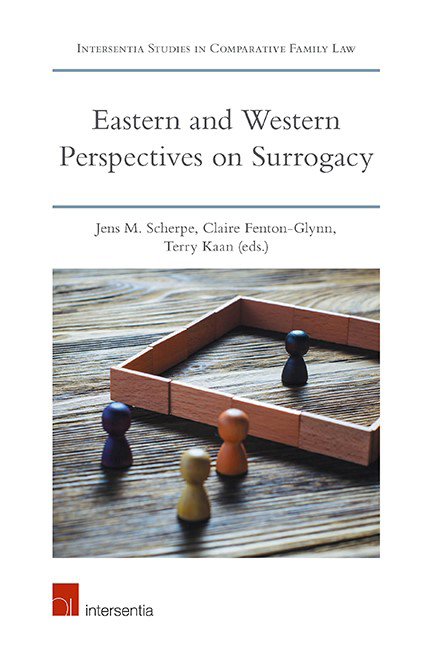Book contents
- Frontmatter
- Preface and Acknowledgements
- Contents
- List of Contributors
- Introduction
- Questionnaire
- PART I WESTERN PERSPECTIVES
- THE PROHIBITIVE APPROACH
- THE TOLERANT APPROACH
- THE REGULATORY APPROACH
- THE FREE MARKET APPROACH
- THE INFLUENCE OF INTERNATIONAL COURTS
- PART II EASTERN PERSPECTIVES
- THE PROHIBITIVE APPROACH
- China
- Taiwan
- Singapore
- A TOLERANT APPROACH?
- REGULATION THROUGH PROFESSIONAL MEDICAL BODIES
- FROM FREE MARKET TO REGULATION
- PART III COMPARATIVE PERSPECTIVES ON SURROGACY
- Index
- About the Editors
Taiwan
from THE PROHIBITIVE APPROACH
Published online by Cambridge University Press: 26 June 2019
- Frontmatter
- Preface and Acknowledgements
- Contents
- List of Contributors
- Introduction
- Questionnaire
- PART I WESTERN PERSPECTIVES
- THE PROHIBITIVE APPROACH
- THE TOLERANT APPROACH
- THE REGULATORY APPROACH
- THE FREE MARKET APPROACH
- THE INFLUENCE OF INTERNATIONAL COURTS
- PART II EASTERN PERSPECTIVES
- THE PROHIBITIVE APPROACH
- China
- Taiwan
- Singapore
- A TOLERANT APPROACH?
- REGULATION THROUGH PROFESSIONAL MEDICAL BODIES
- FROM FREE MARKET TO REGULATION
- PART III COMPARATIVE PERSPECTIVES ON SURROGACY
- Index
- About the Editors
Summary
The legal approaches to surrogacy vary widely around the globe. In Asia, commercial surrogacy is prohibited in many countries, though in several jurisdictions surrogacy is merely unregulated. Taiwan falls into the latter group, despite legalising altruistic surrogacy being discussed for more than a decade. The legal vacuum on the issue forces infertile couples who wish to have their own biological child into the global commercial surrogacy market to seek a possible resolution. Challenges exist in seeking to reach a consensus in Taiwan over controversial aspects of regulating surrogacy and balancing the rights and interests of surrogates, would-be parents commissioning this service, and children born via surrogacy. This chapter discusses the legal and ethical concerns on legalising surrogacy. It first introduces the historical background, statistics and general legal framework on assisted reproduction in Taiwan. It then illustrates the prolonged legislative trajectory on surrogacy in Taiwan and analyses recent draft amendments relating to surrogacy, such as eligibility criteria for commissioning parents, and surrogates, surrogacy contracts, agencies, and the arrangement of legal parenthood. Finally, the chapter elucidates issues concerning international surrogacy arrangements and the socio-legal causes behind the debates over amendments on regulating surrogacy in Taiwan.
GENERAL LEGAL FRAMEWORK
HISTORICAL BACKGROUND
Demand for assisted reproduction has been growing rapidly around the world as people seek to take advantage of the medical and technical advances in assisted reproductive technologies (‘ART’). Statistics published by the Taiwan Health Promotion Administration (‘HPA’) of the Ministry of Health and Welfare (‘MOHW’) demonstrate that in the past decades, the share of test-tube baby births as a percentage of overall births in Taiwan has risen from 1.38 per cent to 3.24 per cent, the equivalent of a rise from 2,500 to 5,800 infants. Since 1985, when Taiwan's first test-tube baby was successfully delivered at the Veterans General Hospital in Taipei, further debates and discussions in the Taiwanese society on legal and ethical issues of the application of ART, such as in vitro fertilisation (‘IVF’) and surrogate motherhood emerged. Even though the demand of assisted reproduction has been increasing, nonetheless, the process of legislative enactment in the jurisdiction to regulate surrogacy has never been smooth. In 1986, the Department of Health (‘DOH’, the former MOHW) issued ethical guidelines to regulate human assisted reproduction.
- Type
- Chapter
- Information
- Eastern and Western Perspectives on Surrogacy , pp. 377 - 396Publisher: IntersentiaPrint publication year: 2019



